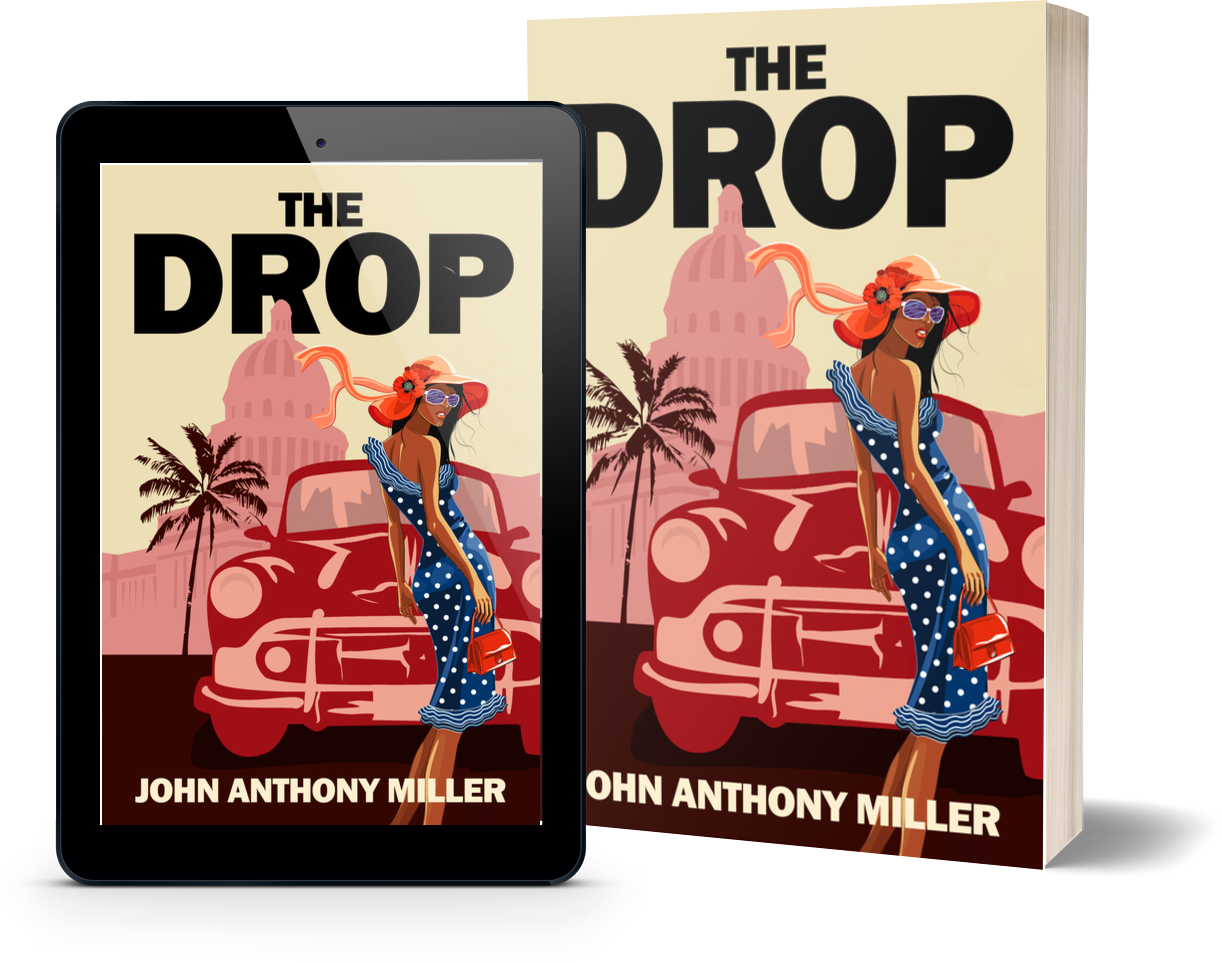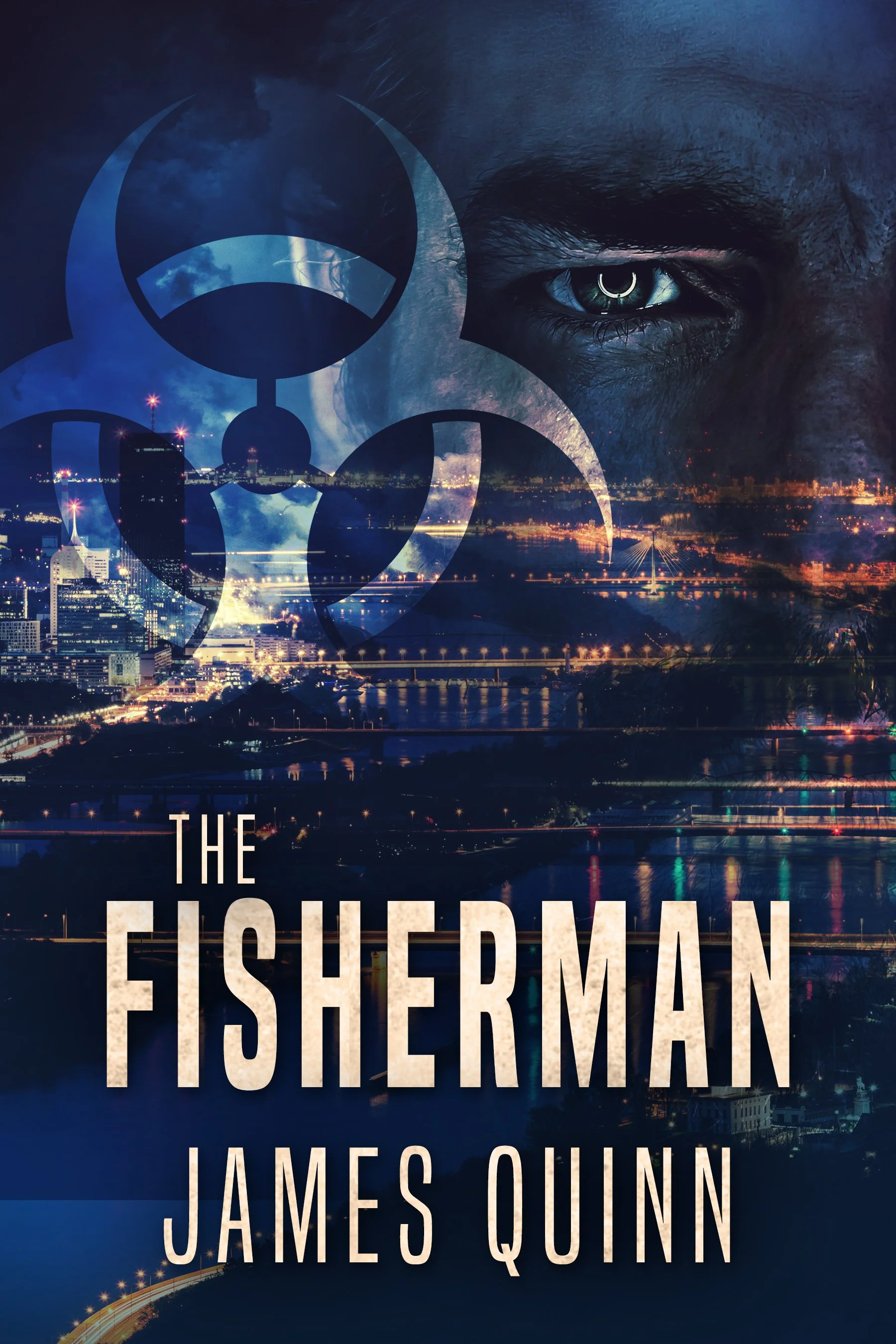The Drop
Book summary
In 1958 Havana, Ariana Rojas, driven by vengeance, joins revolutionaries to overthrow the Cuban government and kidnaps a wealthy American for ransom, only to discover his wife won't pay. THE DROP by John Anthony Miller is a gripping political thriller with unexpected twists and memorable characters.
Excerpt from The Drop
July 26, 1958 at 07:11 a.m.
Six Miles East of Havana, Cuba
The concrete walls were twenty feet high, broad at the bottom but slim at the top and capped by barbed wire. Towers sprouted from each corner, manned by guards with machine guns who watched the barren ground that stretched from the walls to the trees in the distance. The fortress was imposing. It would discourage an enemy, defeat an attacker, deter the most formidable foe—if that was its purpose. But it wasn’t designed to keep people out. It was built to keep them in.
They were political prisoners. Those brave enough to disagree, offer opposing views, challenge conventional wisdom. If nothing else, they expressed ideas that deserved to be heard. But they paid a price for daring to dream. Many lost their lives behind the massive walls of one of the world’s most notorious prisons. Many more lost their minds.
Two steel doors admitted the vehicles needed to support a prison population that counted so many thousand souls. A single-story office building with narrow windows sat beside the doors, an island of freedom in a continent of convicts, a link to a world those inside had forgotten. Through this office, on very rare occasions, a prisoner walked out, having paid their debt to society. But they were never the same as when they walked in. Their days were too horrendous, their minds too scarred.
Ariana Rojas sat in the driver’s seat of her 1955 black Ford, waiting for a man to emerge. She was attractive—an olive complexion, wavy black hair, and dark eyes. Slender and graceful, poised and articulate, she was an intellectual from a once-wealthy family.
Not yet thirty, she often claimed her devotion to the revolution, driven by her hatred for Fulgencio Batista, a brutal dictator who destroyed her family. Although born to privilege, she barely survived, working as a maid at the Paradise Hotel and living in a third-floor apartment in a century-old building. The luxuries in life she had once enjoyed had vanished, the memories surreal, the dream a nightmare.
She looked at her watch, waiting. The sun rose, promising another hot day. A gentle breeze blew in from the ocean, four miles north, and a kaleidoscope of palm trees, orchids, and lilies sprouted from the edge of the barren strip that circled the prison walls. She shivered, even in the heat, knowing that the man she was about to meet might remotely resemble the one she had left a year before.
The door to the office opened, and he stepped out, lean and hard, ruggedly handsome. A scraggly beard sprawled across his face, his dark eyes alive with conviction. His gray suit was wrinkled, ill-fitting, not worn since he arrived. An attorney before imprisonment, he was a shadow of the man who wore it before, the suit symbolizing the life he left rather than the one he was about to live.
Ariana Rojas got out of the car to greet him. She saw his eyes, consumed with rage, and for a moment she paused, afraid. She approached him tentatively, knowing prison changes a man—and never for the better. “I thought this day would never come,” she said.
“Nor did I,” Rafael replied. He hugged her and, after a moment, moved away. “But it did. And that’s what matters most.”
They had never been lovers, not even friends. But they united to overthrow the government of Batista. It was a bond formed by many, creating fragments of revolution scattered throughout the country. And as each day passed, they organized as needed, grew stronger, became more effective, threatening a government they had once barely bothered.
“The others are waiting,” she said.
They got in the car and drove away, down the long driveway to an intersecting street that led to the highway. She looked back at the prison in the rearview mirror, knowing it overflowed with many who didn’t deserve to be there. It was a sight she had seen many times, an image she would rather forget.
“I will never be in prison again,” Rafael said. “I’ll be free, or I will die.”
“You will live forever,” Ariana said softly. “In name and in cause.”
“There are others who guide the revolution,” he said humbly. “I am but a soldier.”
“With many who follow you.”
“It’ll be good to see them. Their loyalty kept me alive.”
“We’re going to the coast,” she said. “Others wait in the mountains.”
“I want to be near Havana.”
Ariana was wary of the man he’d become, driven by hatred, steered by revenge. She looked at Rafael, his cheeks hollow, his eyes crazed, and she wondered if he could see what needed to be seen. “I brought you some food,” she said.
“Many starved to death.”
“I know,” she said softly. “My father among them.”
“A martyr to the cause.”
“I live to avenge him.”
“Your family is well?” Rafael asked.
Ariana paused, reflecting on a family that had been torn apart. “My mother and sisters are in Argentina,” she said. “My brother is in America. They’re poor, like me. My family’s wealth is gone. Never to return.”
“All the more reason to fight,” he said.
Ariana glanced in the rearview mirror. “Food is in the knapsack on the back seat,” she said. “There’s fresh fruit—bananas and oranges—and some croissants and juice.”
Rafael reached in the back, grabbed the knapsack, and pulled it onto his lap. He removed a bottle of apple juice, opened it, and took a swig, and then he withdrew a banana and peeled it.
“You would prefer steak, I’m sure,” Ariana said, glancing at his thin fingers.
“After a year of soy beef, or egg yolk littered with broken shells, I could eat anything.”
Rafael finished the banana quickly and peeled another. He took a bite and leaned his head out the window. “The air is fresh,” he said. “And the world so open.”
“You have the whole universe,” she said as she turned onto the highway. “Instead of a prison cell.”
“A cell I shared with roaches, rats, and mosquitoes. The ceiling was covered with tarps because the bathroom above leaked, raining human waste.”
“It’s over now,” Ariana said softly, not wanting to know more. “Gone forever.”
“It’s time to fight,” Rafael said as he withdrew a croissant from the knapsack and bit into it, acting as if he had never eaten before. “We have to save Cuba.”
Ariana was quiet, alarmed by his glare. She had seen it before, in the eyes of her father. “Many support the cause,” she said. “Castro is strongest, but he’s in hiding. No one knows where.”
“Does he fight or talk?”
“The days for talk are done,” she said. “He fights. We all fight.”
“Does Batista respond?”
“Yes, in the mountains,” Ariana said. “He uses bombers and shells from ships offshore.”
“Who fights in Havana?”
“No one,” she said. “Resistance is sporadic.”
“Then we fight in Havana.”
“And if they oppose?” Ariana asked.
Rafael looked at her, the fire in his eyes blazing. “Then let blood be shed.”
It was a typical Friday night at the Paradise Casino: a band played Cuban music, slot machines rang as each lever was pulled, roulette wheels spun as new bets were placed, and the clamor of conversation competed with the noise so common to a boisterous crowd. Cigarette smoke hung in the air, drifting lazily near the lights, as scantily dressed women walked the floor carrying trays of whisky, bourbon, martinis, and beer. Winners celebrated, losers planned their revenge, the band played, couples danced, dealers dealt, and customers talked and laughed and gambled.
At least until the bomb went off.
There wasn’t any warning. Just a thunderous blast with a flash of light. Glass shattered, the front of the building shook, and blood sprayed on the gold wallpaper. Arms and legs dangled in the aisles, crooked and twisted, and a stinking smoke filled the casino. Screams and cries from the wounded replaced gamblers’ voices, dealers’ directions, and noisy slot machines. The band playing mambo seconds before was silent, the stage deserted, as if no entertainment had ever been provided.
“Help!” someone near the entrance called. “Help me—I’m hurt!”
“My wife needs a doctor,” said an elderly man, disheveled and confused.
Jimmy Foster was in the rear of the casino when the blast occurred, just another handsome, well-dressed American enjoying a weekend away. But he dropped to the red carpet when the building shook, the crystal lights masked in smoky fog. He was watching a blackjack game one minute, diving to the floor the next. He lay still at first, surprised by the blast but suspecting he knew why it occurred.
Guests screamed in shock and pain. Jimmy struggled to see what happened once the smoke began to lift. He rose to one knee and waited, watching turmoil grip the casino. People scrambled by, stepping over those on the floor, and a man bumped into him, running for the exit, and knocked him to the floor.
“It was a bomb,” the man shouted. “Get out! There may be more.”
Jimmy waited for the chaos to quell. He watched legs in stockings and high heels run past, led by trousers and polished shoes. He heard sirens in the distance, police and ambulances rushing to the scene, and he wondered how many were hurt or killed. A few moments later, he rose and stood in the aisle.
Jimmy couldn’t see the bomber. Maybe the culprit calmly placed a suitcase under a gambling table and walked out the front door, leaving helpless victims to be murdered and maimed. That would be the easiest way to do it. That’s what he would have done if he was one of the revolutionaries. Then you didn’t have to see the victims. It wasn’t personal. It was just a job, an assigned task, a mission completed.
As people pushed past, Jimmy smelled sulfur and tasted acrid smoke. His ears rung. He looked over the casino floor, searching for injured who might need help. The blast was near the entrance, not far from the stage where the band had been playing but closer to the roulette tables. It was where high rollers laid down the biggest bets the casino accepted, usually under the gaze of envious onlookers. Jimmy noticed that’s where the greatest damage had been done—as if sending a signal that the rich would pay as the poor revolted. If he ever doubted the growing power of the revolution, he didn’t now.

















Praesent id libero id metus varius consectetur ac eget diam. Nulla felis nunc, consequat laoreet lacus id.